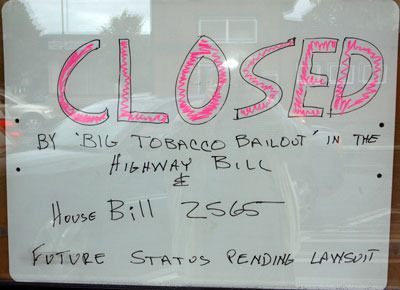MARYSVILLE — Michael Thorn opened Marysville Tobacco Joes nearly a year ago, but the latest legal developments regarding the status of roll-your-own tobacco, both in Washington state and at the federal level, have seen him shut his doors for the time being, and possibly for good.
Thorn closed the doors of Marysville Tobacco Joes at 7 p.m. on Saturday, June 30, just days after he believed he’d received a reprieve from House Bill 2565, which was passed into law in April by a bipartisan majority of state legislators and requires operators of roll-your-own cigarette stores to collect a tax on the cigarettes that their customers produce with the stores’ roll-your-own cigarette machines.
Franklin County Superior Court Judge Bruce Spanner issued a preliminary injunction on Monday, June 25, preventing the state from collecting the tax on its planned start date of Sunday, July 1, by ruling that Initiative 1053 required state legislators to approve the tax by a two-thirds majority, which they’d failed to obtain. Unfortunately for Thorn and his fellow roll-your-own store operators, the state Attorney General’s office then sought and obtained a stay of Spanner’s injunction from the state Supreme Court within the same week, and a rider has been attached to the federal transportation bill before President Obama, which would revise the IRS tax code to require roll-your-own store operators to obtain manufacturing permits.
“That would immediately put us out of business,” Thorn said. “The tobacco manufacturing license is not being issued due to ongoing unrelated litigation, and to get a license to manufacture tobacco products, by law, you cannot have a retail area in same building you manufacture in.”
Thorn noted that the cigarette tubes which would be required, in order to meet fire safety regulations, are not available for any roll-your-own cigarette machine, and the machines would be required to package cigarettes in 20-unit increments that would be sealed with labels, even though the ability to customize the amount of cigarettes that they make is one of the reasons why Thorn’s customers have told him that they prefer to come to his shop rather than purchasing pre-manufactured cigarettes.
“We’re pursuing legal avenues to resolve these issues, but until then we’ll remain closed,” Thorn said. “If the outcome remains the same, we may reopen for a week, but only to liquidate our inventory in late July.”
Joe Baba, an Everett-based tobacco distributor for the state who owns multiple roll-your-own cigarette stores in the area, echoed Thorn’s accusation that “Big Tobacco” has been funding efforts to undermine the roll-your-own cigarette stores out of fear of competition.
“We’re only allowed to use one brand of tobacco now, which isn’t even available yet,” said Baba, who also hopes to continue the fight through the courts. “The government feels like it has the right to take away our customers’ right to choose. Our machines may be silent, but our voices are loud.”


